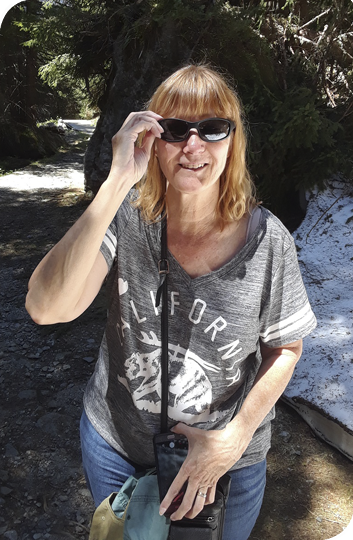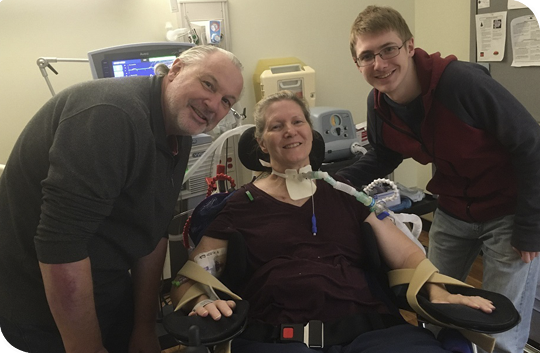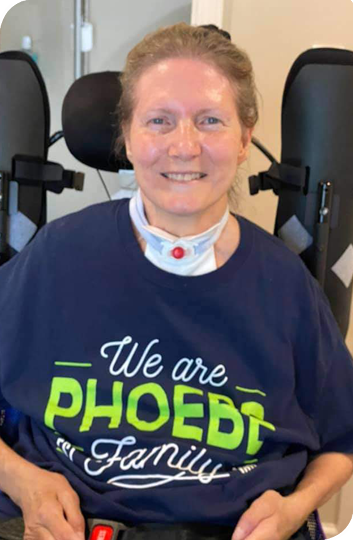Phoebe Employee Shares Her Story During Disability Employment Awareness Month
Albany, GA | October 20, 2023 – On a November evening in 2019, Diane Boesten was leaving work as an Information Systems Clinical Analyst at Phoebe when her life changed in an instant.
 “I got t-boned at 3rd and Slappey by a drunk driver. He was a repeat offender,” Diane said. “I don’t remember the accident at all. People tell me I talked to the paramedics and the people in the ER, but I don’t remember that. Surely, your life can change on a dime.”
“I got t-boned at 3rd and Slappey by a drunk driver. He was a repeat offender,” Diane said. “I don’t remember the accident at all. People tell me I talked to the paramedics and the people in the ER, but I don’t remember that. Surely, your life can change on a dime.”
As she answers questions about that awful day, Diane is seated in a wheelchair with an assistive airflow device that allows her to move the chair around using her breath. Diane is a quadriplegic. “I can only move my head, and thankfully I can speak and breathe, and I can move my shoulders a little bit, but everything else – I can’t do anything on my own. Somebody has to do basically everything for me,” she said.
Diane says she got great care at Phoebe for more than a month after the crash, before being transferred to the Shepherd Center, a hospital in Atlanta specializing in spinal cord and brain injury rehabilitation. “I did a lot of rehab there, getting used to what I could and could not do. They got me off the ventilator and got me as prepared for life as I could be, but we still learn something new every day,” she said.
Diane began working as a bedside nurse at Phoebe 18 years ago, but several years before the crash, she transferred to Information Systems to train new nurses how to use the medication portion of the hospital’s electronic medical records system. “I still have to use clinical thinking for what I do because I’m supporting nurses at the bedside. I’m very concerned about med safety, and this way I can still be part of that,” she said.
 As much as she loved her job, Diane worried she would never be able to work again following the crash, but Phoebe made sure she was able to keep her job and continue to help newly-hired nurses understand the importance of patient safety. “I’m grateful. Phoebe has been very good to me. They’re very patient. They’re flexible, and they’re always offering anything they can do to help,” she said. “I get to do online meetings and still feel part of my team. And when I run into people, they’re so happy to see me. That makes me feel good, so I love my coworkers.”
As much as she loved her job, Diane worried she would never be able to work again following the crash, but Phoebe made sure she was able to keep her job and continue to help newly-hired nurses understand the importance of patient safety. “I’m grateful. Phoebe has been very good to me. They’re very patient. They’re flexible, and they’re always offering anything they can do to help,” she said. “I get to do online meetings and still feel part of my team. And when I run into people, they’re so happy to see me. That makes me feel good, so I love my coworkers.”
October is National Disability Employment Awareness Month, a time to recognize the contributions of people with disabilities to America’s workplaces and economy. Diane encourages people to focus on what individuals like her can do, rather than just what they can’t. “We can still offer something. I want them to give people a chance and encourage them to be active and not just lay there or sit at home,” Diane said. “It’s important to come up with ways to keep people involved, to keep people active and content and happy and feeling alive, even if their life has changed drastically.”
 Diane’s husband, Johannes (Jan), agrees that still being able to work has been exceptionally beneficial for Diane. “It’s incredibly important. We are incredibly thankful to the Phoebe organization for the way they have responded,” he said. “I wouldn’t know how we could have continued the care she needs without being insured, but also the mental aspect of just being part of something has been so helpful.”
Diane’s husband, Johannes (Jan), agrees that still being able to work has been exceptionally beneficial for Diane. “It’s incredibly important. We are incredibly thankful to the Phoebe organization for the way they have responded,” he said. “I wouldn’t know how we could have continued the care she needs without being insured, but also the mental aspect of just being part of something has been so helpful.”
Jan is by his wife’s side every day as her primary caregiver. “Diane is my hero. She is an absolutely gorgeous human being. Her character – I have never seen before,” he said. “I feel that I’m kind of fighting not just for her but for caregivers. I want to try to communicate that this is such a devastating blow to Diane, but also to immediate family and friends and the whole community,” he added.
Unfortunately, Jan says most people would rather ignore people like Diane, instead of facing the difficult questions that her challenges bring up. “It’s incredible that the richest country in the world cannot set up a better system to take care of its disabled citizens,” he said. “I have a huge problem seeing insurance companies making billions and billions of dollars in profits, but since she didn’t get hit by somebody who is well-insured or by a rich company, she got no support for the care she needs for the rest of her life.”
He's also frustrated by daily realities like handicapped parking places that aren’t big enough to accommodate his van with Diane’s wheelchair ramp or seeing people with no physical challenges taking up limited handicapped parking spots. “Maybe we need more people who honestly talk about these situations and educate people. We are so unwilling to talk about this in an honest way, mentioning all the consequences of living with a major disability.”
Despite those daily challenges, Diane remains upbeat. “I have a lot of people ask if I get depressed, and amazingly, I don’t,” she said. “I’m not saying I don’t have my bad days, but for the most part, I remain content and try to be positive and keep my faith and keep my family and friends close by and stay as active as possible.”
And she’s grateful to have a job to help her do just that. “You’ve got to have something to live for, and I appreciate every opportunity I have, whether it’s work, family or otherwise.”